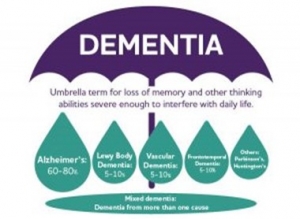So in my last blog I touched on Dementia. This week I will round that off with a talk about the different types of Dementia.
The 5 types of Dementia

There are typically five types of progressive dementia.
Alzheimer’s Disease
Alzheimer’s disease is the most common type of dementia. And unfortunately, people whose parents have Alzheimer’s are at risk of it. That’s because one of the causes of Alzheimer’s disease is a mutation of three genes, which can be passed from parent to offspring. However, this is just one out of the many causes of Alzheimer’s. Many of the causes are still unknown.
Common signs of dementia include:
- Confusion about where they are and what day or year it is
- Difficulty expressing themselves because they can’t remember suitable words
- Losing things and difficulty remembering where they kept them
- Mood swings and depressive moments
Vascular Dementia
Vascular dementia often results from strokes and other cardiovascular incidents. The shock to the blood vessels causes damage to the brain, such as tissue loss. After a stroke or similar incidents, the patient may start having memory deficiency and trouble planning and making decisions. These are the first signs of vascular dementia.
Other symptoms of vascular dementia include:
- Progressive memory loss
- Trouble speaking or understanding others
- Instability and frequent falls
- Trouble recognizing things that were originally familiar to them, such as their favourite songs
- Confusion and agitation
- Mood disorders
Dementia with Lewy Bodies
This condition has symptoms like Parkinson, such as tremors and stiffness. The patient may also suffer from hallucinations. Lewy Body dementia results when clumps of protein, known as Lewy bodies, form in the brain. These same clumps also form in patients with Parkinson’s and Alzheimer’s diseases. However, the symptoms are different, and that’s how you know it’s Lewy Body Dementia and not Alzheimer.
Common symptoms of Lewy Body Dementia include:
- Hallucinations
- Acting out one’s dream while sleeping
- Problems focusing and paying attention
- Abnormally slow movement, tremors, and rigidity (as with Parkinson’s disease).
Frontotemporal Dementia
When the neurodegeneration majorly affects the temporal and frontal lobes of the brain, the condition is classified as frontotemporal dementia. This type of dementia typically impacts the person’s behaviour and personality, although they may still show signs of memory loss.
Symptoms specific to frontotemporal dementia include:
- Movement problems, such as falling, wobbling, and muscle spasms
- Problems finding the right words to use
- Sudden lack of inhibitions, like someone under alcohol influence.
Mixed Dementia
As the name suggests, this is a combination of two types of dementia. Interestingly, autopsy studies of dementia patients of 80 years and above showed that they had a combination of different dementia types. The most common combination is Alzheimer’s disease and vascular dementia. Some also included Lewy body dementia. However, there is not much research on ground regarding the specific symptoms mixed dementia patients experience
Diagnosis of Dementia
Diagnosis of dementia involves a thorough medical history, physical examination, cognitive assessments, and sometimes brain imaging. While there is no cure for most types of dementia, early diagnosis can help manage symptoms, provide support, and plan for the future
Caring for someone with dementia can be challenging, and families often seek assistance from healthcare professionals, support groups, and specialized care facilities to ensure the best possible quality of life for the affected individuals. Researchers continue to study dementia to better understand its causes and develop potential treatments and preventive measures. If you or someone you know is concerned about dementia symptoms, it’s essential to consult a healthcare professional for proper evaluation and guidance.
Recap
If your elderly loved one has dementia, there’s every need to keep an eye on them at all times. Putting them in a Care Home becomes a wise choice.
But you want to put your loving parent in a home you can be proud of, a worthy place they deserve, a home away from home.
At Alexander House Rest Home, we understand that, and we provide a place where our residents can feel at home and even invite their friends over just as they would when on their actual property. We’re all about retaining that homely feel for you and your parent.
Let us help you give your loving parent the care they deserve so you can be relieved of your responsibilities to enable you to spend more quality time with them.
Needing support and more information about Dementia? Here are links to support organisations in NZ
Support Organisations:
- Alzheimer’s New Zealand – alzheimers.org.nz
- NZ Dementia Co-operative – nzdementia.org
- Dementia New Zealand – dementia.nz
